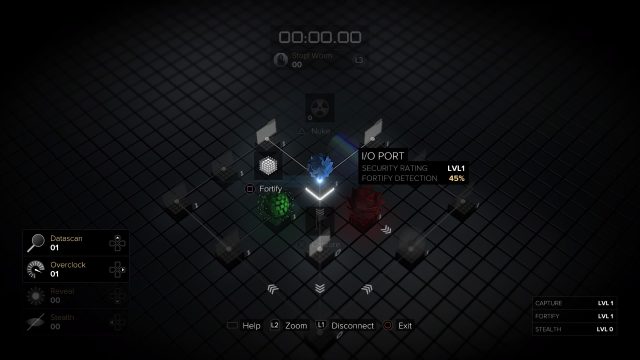Big city, big dreams
Some of the game's mission sequences are among the best I've seen in the cyberpunk-adventure genre, and a lot of that has to do with the buildings. This game was not designed to resemble a bunch of cordoned-off video game levels, but rather its buildings, structures, and cityscapes appear to be built for normal purposes. Into those, Eidos Montreal chiseled out a lot of interesting paths, both for explosive, run-and-gun combat and hide-and-stealth sneakery. The bank, the underground poker hall, the slum marketplace: these are all bustling zones that strike the right balance between feeling real and feeling built for exciting gameplay.
During combat, the AI is pretty good, though perhaps not as good as in the latest Hitman. Two times in my review gameplay, foes stupidly lined up, one by one, at a choke point from which I could pick them off easily and waltz through a giant portion of a mission. But for the most part, the foes peppering your locations are at least pesky when they're not always smart. What's more, Eidos Montreal understands how to place its grunts and guards within these giant structures, and they're mostly there to force you out of a default "run in and shoot everybody" strategy. Even if you decide to play as a ruthless killer instead of a stealthy ghost, you'll die very quickly if you expose yourself openly. You'll want to scan ahead, find good points of cover, and keep an eye out for shortcuts and hidden vent paths whenever possible.
A slight tweak to cover-based combat also helps in the stealth-combat department. When you duck behind a box, a desk, or some other conveniently placed waist-high object, you can now see a small body-shaped icon projecting exactly wherever you want to jump or run to next. It's a great visual cue that's doubly useful when you absolutely, positively don't want to wind up exposing yourself at the wrong place or in the wrong angle. This system also lets you round the corners of your cover object very easily by just holding down your main activation button so that you don't have to jump out of cover to reposition yourself. Very slick.
Refreshingly, it's also a blast not getting into much combat. Faking like a rat and slithering against a given zone's fringes and vents is usually quite rewarding, especially thanks to so much story being scattered in places like people's bedrooms and offices. Plot vehicles like e-mail terminals and books have become old hat in 3D adventure games as of late, but DX:MD does a lot to build its characters up with stories hidden in its nooks and crannies. Thank goodness the game's "hacking" minigames have been spruced up. If you come to this game seeking plot, you'll have to do a lot of hacking, and the grid-takeover game needed for every interface has just enough quick-strategy challenge to keep it interesting again and again.

In spite of his gravelly, two-packs-a-day voice, Jensen's voice actor generally kills it here, thanks both to believable anti-hero delivery and to a solid script all the way around. Other voice actors range from melodramatic to serviceable to damned good, and the dialogue only gets corny when a character is clearly a ham. Otherwise, heavy issues ranging from immigration to drug distribution to media responsibility all get paid surprisingly good lip service by this script, and Jensen's relationships with everyone, from his military superiors to his underground accomplices, fuel the page-turning aspect of this game's very, very long dialogue sequences. You're going to hear a lot of chatter in this game's dozens of hours—and praise be, it's mostly good.
The only exception, really, is the main thrust of the plot: humans and "clanks" (the slur applied to the game's augmented people) have been separated by a cyberpunk version of apartheid. The world is turning drastically against people who had machinery installed. The plot tries to draw parallels with other oppressive movements, but that comparison feels a little tone-deaf at times. Not outright offensive or horribly fumbled, mind you, but it's hard not to see elements in this game, like an "augs only" sign on a door, and feel like some of history's greatest prejudicial atrocities aren't getting their fair due in comparison.
But wait—there's more!
DX:MD has a giant campaign worth losing time within. My 30 hours with the game ahead of its launch left me salivating for more—and this trial clearly showed that the last game's wretched, decried boss battles are gone. Greater augmented baddies await as I barrel my way toward the campaign's end, but I've already had to deal with high-intensity villains and to discover non-lethal means of taking them down or avoiding them altogether.
If this campaign was the whole package, I'd call it a must-buy game.
-
Let's soup up our avatar with perks and bonuses!
-
The VR missions look damned cool, though sometimes the limited color palette of a given mission makes its content hard to parse.
-
The in-game shop doesn't allow you to spend real money. Yet.
-
The more you play, the more bonuses, items, and "challenges" you can apply to future runs.
-
Everything about Breach seems built for microtransactions—and yet I never came close to needing to spend real money (which I couldn't do in the pre-launch version, anyway).
Then Eidos Montreal went and added another game to the mix: Deus Ex: Breach. This side game casts you as, well, yourself—logging into a virtual reality interface and helping the hackers of 2029 explore the datacenters of the game's biggest evil corporations. Forget telnet interfaces; instead, you take these datacenters down by playing miniature Deus Ex challenge levels and either killing the digital guards within or exiting the levels with downloads of their most precious terabytes of corporate data.
It's a goofy premise, but considering it's essentially the Deus Ex world's version of the original Metal Gear Solid's masterful VR missions, we'll allow it. The quick-burst opportunities to employ your personal mix of stealth and combat seem like the kind of thing someone should have modded into Deus Ex years ago; it's a great way to plunk down about 15 minutes of time into a bunch of satisfying missions (or to spend all 15 of those minutes trying to get your highest score possible in one particular mission). These all control largely like the normal game, even with the same power-up systems—though instead of your personal system "overheating" due to experimental upgrades, now it can only accept so many specific power-ups. (In sticking with the VR-hacker theme, each equipped perk requires a certain number of GB in your memory, and that count can grow as you level your character up.)
If pure action doesn't quite do it for you, Eidos Montreal went and sewed a plot structure into Breach—certain missions contribute toward a campaign to take down specific corporate crimes. You're not going to call this the gaming plot of the year by a long shot, but the effort is appreciated, and it's handled with a slick chat-text interface.
The hook of these small, frequent levels is that your progress earns you credits that you can spend on more guns, more ammo, more items, and more "challenge" patches, which are all granted randomly via "card packs." The patch system is probably the most interesting, in that you can slap a patch onto a level run that pays you more credits if you complete a level with, say, only a certain type of weapon or without killing a single guard. For this sort of random-item game, I think the challenge-for-bonus system is among the cooler surprises.
Otherwise, we've seen this sort of system before; Breach is clearly built to stoke the same fires that burn when you unlock new cards or items in games like Hearthstone. I imagine this mode is an experiment on Eidos Montreal's part to see how people react to being able to pay real money to buy more virtual items in Deus Ex games. That being said, thanks to perks that you can unlock in the campaign mode that apply to Breach and other normal progression within this mode, I never found myself wanting to spend real money. A full gameplay experience seems to have been baked in. (And in good news, you never have to play Breach to acquire any bonuses or perks in the campaign mode, should that be a dealbreaker for you.)

DX:MD packs in more Deus Ex, mostly polished, with tons of plot that we don't want to spoil, a bazillion side quests and optional plot to sink your teeth into, a likable story, missions so good that I have described them to friends as "boss levels," and a free side game with a tolerable microtransaction system. I'm still shocked. August is usually the triple-A dumping ground of the game-industry calendar, but August hasn't seen a game this good in years.
The good:
- New powers add welcome juice to what were already solid stealth and combat systems
- Dialogue is written as well as it's acted, with an abundance of side plots to make for a rich quest
- Elaborate city and mission environments strike a satisfying balance between "it feels real" and "it plays well as a game"
- An entire bonus game that nails the concept of "arcade" Deus Ex
The bad:
- It's better-looking than an Xbox 360 game, but not much (unless you have a souped-up PC, which we tentatively recommend as the "ultimate" version of the game)
- AI can act remarkably stupid at times, which renders a couple of missions moot
The ugly:
- Geez, I dunno... it doesn't fold your laundry or make you a sandwich, I guess
Verdict: Buy. Buy the heck out of this game.
reader comments
133